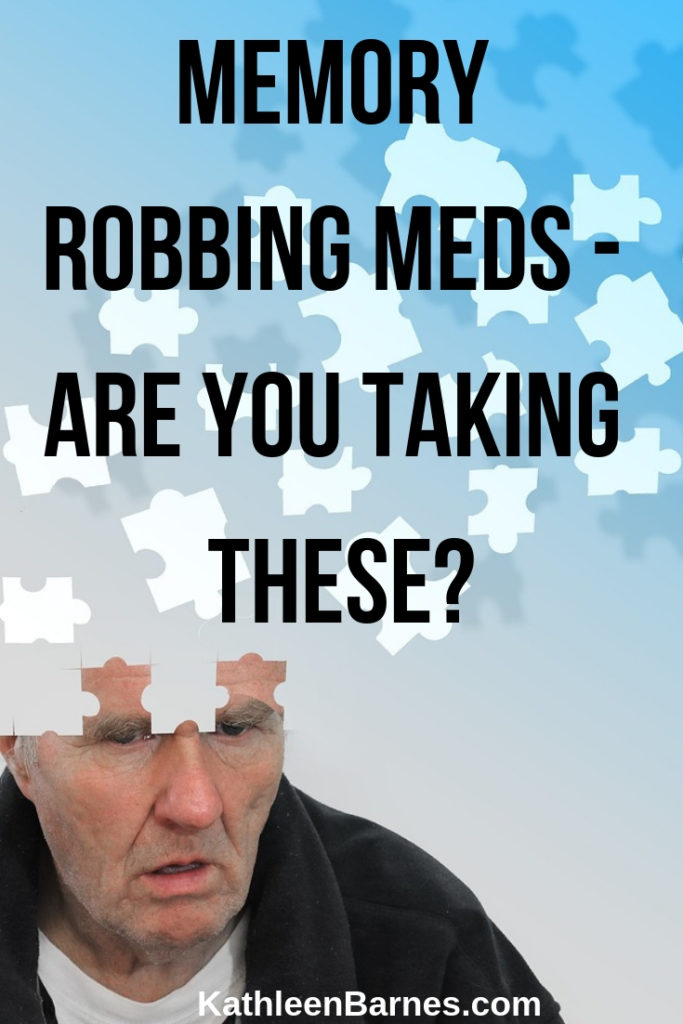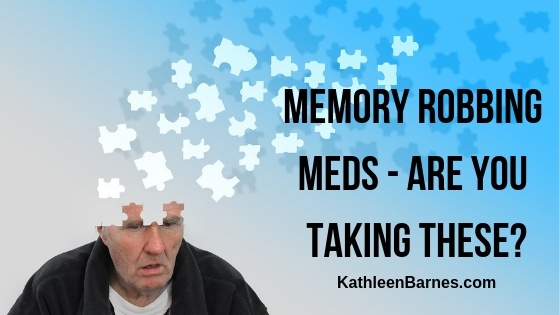
Want to keep all your marbles? We all do. Most of us don’t know that long-term use of certain common prescription drugs and even over-the-counter meds can actually cause memory loss.
I’ll bet you have some of these drugs in your medicine cabinet and maybe your doctor has even insisted you need some of them. Maybe you do, maybe you don’t. There are alternatives.
The memory robbers are called anti-cholinergics, meaning they slow the production of the neurotransmitter (brain chemical) nacetylcholine, which is key to memory retention.
Here are some of the key classifications of the drugs that could cause you problems with your memory, especially if you are taking more than one every day: (Look for part 2 next week for more memory robbing meds.)
- Anti-histamines
- Anti-anxiety drugs
- Cholesterol lowering drugs
- Anti-seizure drugs
- Anti-depressant drugs
Here’s a quick rundown and a brief look at natural alternatives:
- Antihistamines: These are probably the biggest culprit because of their widespread use, their easy availability over the counter and because so many of us suffer from allergies that leads many of us to use them long term. Among them are Benedryl, Tavist and Dimetane. Newer generation antihistamines like Zyrtec and Claritin don’t have the memory robbing effect, but why take the risk when there are plenty of natural alternatives? Among them: raw honey, especially honey made as close as possible to your home rich in local pollens; hot teas, especially stinging nettle and sage; a variety of aromatherapy oils, including eucalyptus, peppermint and frankincense and my favorite, the neti pot that gently irrigates your nasal passages with mild salt water.
- Anti-anxiety drugs called benzodiazepines include Xanax, Valium, Klonopin and many more. For anxiety, consider rhodiola and the new form of echinacea that can actually stop an anxiety attack in minutes.
- Anti-seizure drugs, including Neurontin, Tegretol, Lyrica, Topomax and more, are often prescribed for mood disorders, mania, nerve pain and bipolar disorder. Consider curcumin as an alternative or even prescription drugs with no known impact on memory like Dilantin and Effexor.
- Tricyclic antidepressant drugs, including Elavil, Norpramin, Tofranil and more cause memory loss in more than one-third of the people who take them. Depression is a serious medical condition that should never be taken lightly, but natural alternatives to prescription drugs, including rhodiola, SAM-e, curcumin and HTP can help, along with meditation, yoga, focused breathing and many more.
- All of the cholesterol-lowering statin drugs, including Lipitor, Crestor and Zocor have been implicated in memory loss. Statin drugs are vastly over prescribed. If you have been diagnosed with coronary artery disease, talk to your doctor about talking red yeast rice, sublingual vitamin B12 and/or non-flush niacin.
If you are taking any of these prescription medications. DO NOT stop taking them without consulting a knowledgeable medical professional. Sudden withdrawal can cause serious consequences.
However, if you are taking any of these medications on a regular basis, please consider the possibility they can cause memory loss over the long-term and work with your doctor to find safer alternatives.
Stay with me for Part 2 next week. There are many more medications that can cause memory loss.
I also have more articles on Brain Health and Memory.








Great article 5/29/21
You might add Anticholinergics also are BIG Urinary Retentive culprits, especially “ First Generations “ like Benadryl Chlor- Trimeton etc. How about those of us who have to take Flomax to urinate. Prostrate formulas do not seem to work. Jim St.Gabriel’s Charlotte